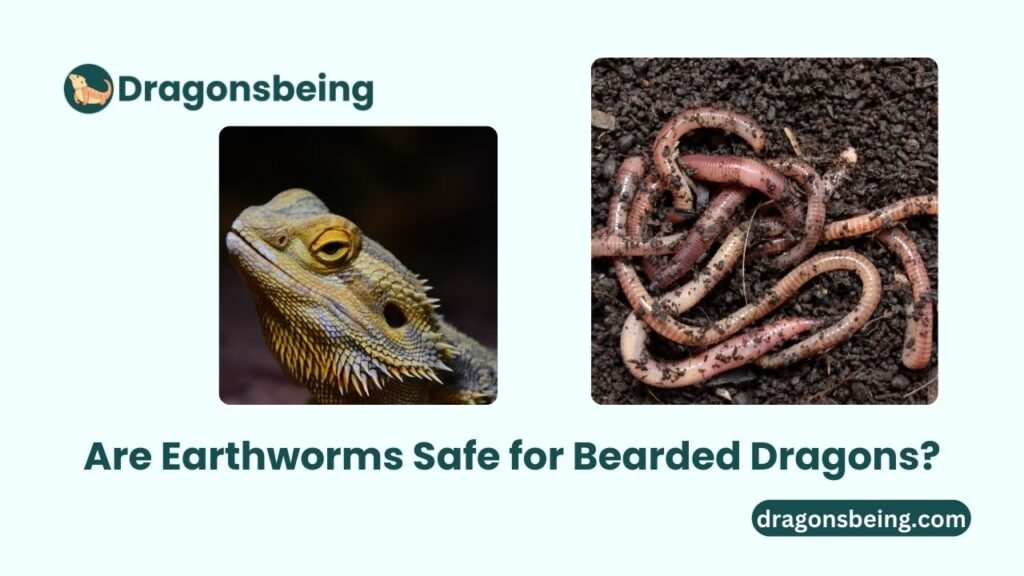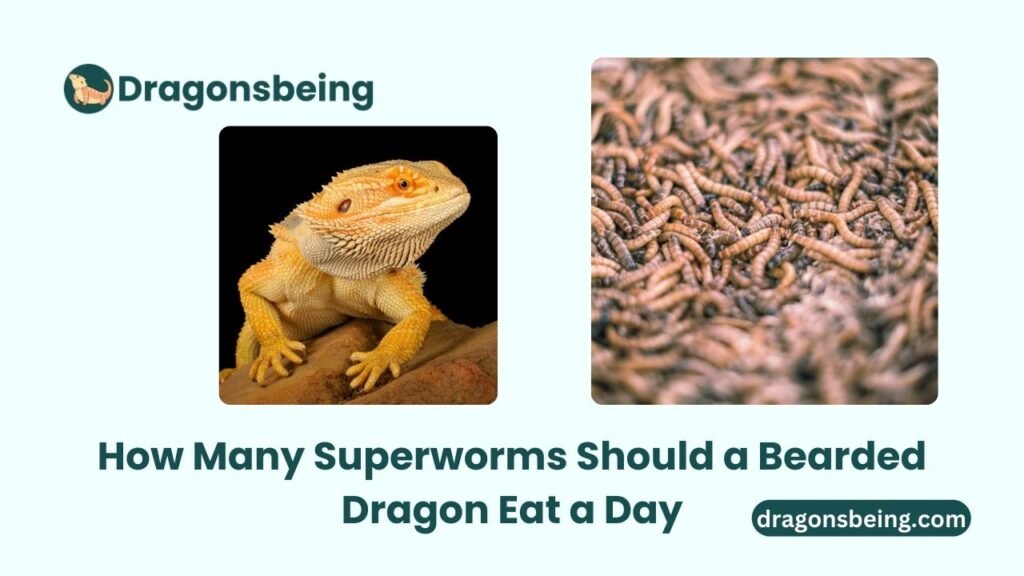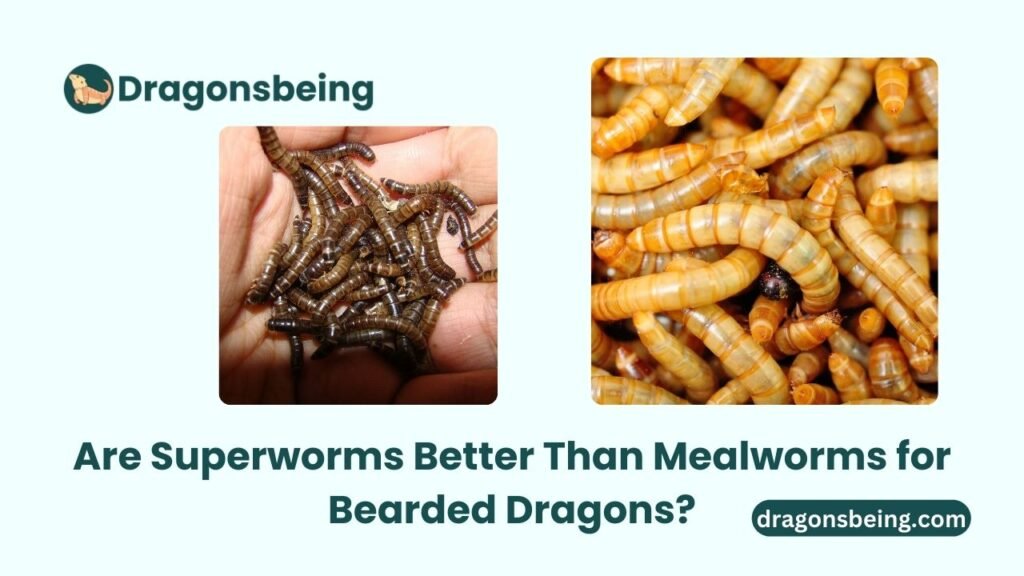Yes, earthworms are safe for bearded dragons in moderation. They provide essential nutrients but can cause digestive issues if overfed.
Bearded dragons are popular pet reptiles known for their unique dietary needs. A well-balanced diet is crucial for their health and growth.
Earthworms can be a beneficial part of their diet, offering protein and other nutrients. However, owners must be cautious about the quantity fed.
Too many earthworms may lead to digestive problems. Understanding the right balance is essential for keeping your bearded dragon healthy.
This guide will explore the benefits and risks of including earthworms in their diet, ensuring your pet thrives while enjoying a varied menu.
Keep reading to learn more about the safest ways to feed earthworms to your bearded dragon.
Earthworms In The Wild Diet
Bearded dragons thrive on a varied diet in the wild. They consume various insects, plants, and small animals. Earthworms are a common food source. Understanding their role helps in providing a balanced diet.
Natural Prey For Bearded Dragons
In their natural habitat, bearded dragons eat:
- Insects
- Fruits
- Vegetables
- Earthworms
Earthworms serve as a natural prey. They are abundant in many environments. Bearded dragons enjoy hunting these wriggly creatures. This behavior mimics their wild instincts.
Nutritional Value Of Earthworms
Earthworms provide essential nutrients for bearded dragons. Here’s a breakdown of their nutritional value:
| Nutrient | Amount per 100g |
|---|---|
| Protein | 20g |
| Fat | 3g |
| Fiber | 1.5g |
| Calcium | 70mg |
| Iron | 2.5mg |
These nutrients support growth, energy, and overall health. Earthworms also aid in digestion. Their soft texture makes them easy to eat.
Consider offering earthworms as part of a varied diet. Monitor how your bearded dragon reacts to them. This ensures they enjoy a healthy and balanced meal plan.
Health Risks Of Feeding Earthworms
Feeding earthworms to bearded dragons can pose certain health risks. Understanding these risks helps ensure your pet remains healthy and happy. Two main concerns are potential parasites and chemical contamination.
Potential Parasites
Earthworms can carry parasites harmful to bearded dragons. Here are some common parasites found in earthworms:
- Protozoa: Single-celled organisms that can cause digestive issues.
- Tapeworms: These can live in the intestines, causing weight loss.
- Nematodes: Roundworms that can lead to serious health problems.
Regular veterinary check-ups can help detect these parasites early. Always source earthworms from reputable suppliers to reduce risks.
Chemical Contamination Concerns
Earthworms may also contain harmful chemicals. Here are some potential sources of contamination:
| Chemical Source | Impact on Bearded Dragons |
|---|---|
| Pesticides | Can lead to poisoning and organ damage. |
| Heavy Metals | May cause neurological issues and growth problems. |
| Fertilizers | Can disrupt digestive health and cause toxicity. |
Always wash earthworms thoroughly. This reduces the risk of chemical exposure. Avoid feeding earthworms from contaminated areas.
Safe Feeding Practices
Feeding your bearded dragon earthworms can be safe and nutritious. Follow these practices to ensure their health. Proper sourcing and portion sizes are key.
Sourcing Earthworms
Choose earthworms from trusted sources. Wild-caught worms may carry parasites. Here are safe options:
- Buy from a reputable pet store.
- Order from reliable online suppliers.
- Use farm-raised worms specifically for reptiles.
Always check for quality. Fresh, healthy worms are crucial.
Proper Portion Sizes
Feeding the right amount of earthworms is essential. Too many can harm your dragon. Here’s a simple guide:
| Age of Bearded Dragon | Recommended Earthworms Per Feeding |
|---|---|
| Juvenile (0-6 months) | 5-10 worms |
| Sub-Adult (6-12 months) | 10-15 worms |
| Adult (1 year and older) | 15-20 worms |
Adjust the amount based on your dragon’s size and activity. Always monitor their weight. Healthy dragons are active and alert.
Alternative Insect Options
Bearded dragons thrive on a varied diet. While earthworms are a popular choice, many other insects are safe and nutritious. Exploring alternative insect options can enhance your dragon’s health. This section covers recommended insects and those to avoid.
Recommended Insects For Bearded Dragons
These insects provide essential nutrients for your bearded dragon:
- Crickets: High in protein and easy to digest.
- Mealworms: Great source of fat; feed in moderation.
- Waxworms: Tasty treat; high in fat.
- Superworms: Nutritious; serve in limited amounts.
- Roaches: Excellent protein source; easy to keep.
Insects To Avoid
Some insects can harm your bearded dragon. Avoid these:
- Fireflies: Toxic to reptiles.
- Wild-caught insects: Pesticides and parasites may be present.
- Stink bugs: Can cause digestive issues.
- Centipedes: Aggressive and venomous.
Choosing the right insects ensures your bearded dragon’s health. Variety is key for a balanced diet. Always source insects from reputable suppliers.
Supplementing With Vegetables
Vegetables are a vital part of a bearded dragon’s diet. They provide essential nutrients and fiber. Supplementing with vegetables enhances their health. Proper choices ensure a balanced diet.
Balancing The Diet
A well-rounded diet is crucial for bearded dragons. They need a mix of proteins and vegetables. Earthworms can be a great protein source. Pairing them with vegetables boosts nutrition.
Here are some tips for balancing their diet:
- Offer a variety of vegetables.
- Include leafy greens regularly.
- Limit high-oxalate vegetables.
- Mix in occasional fruits.
Safe Vegetables For Bearded Dragons
Choosing safe vegetables is essential. Some vegetables are better than others. Here’s a list of suitable options:
| Vegetable | Nutritional Benefits |
|---|---|
| Collard Greens | Rich in calcium and vitamins. |
| Mustard Greens | High in fiber and low in oxalates. |
| Squash | Good source of vitamins A and C. |
| Carrots | High in beta-carotene. |
| Bell Peppers | Rich in vitamins and antioxidants. |
Always wash vegetables before serving. Chop them into small pieces. This helps your bearded dragon eat easily. Avoid feeding them starchy or high-sugar veggies. Stick to the safe options for a healthy diet.
Expert Opinions
Understanding whether earthworms are safe for bearded dragons requires expert insights. Vets and exotic pet specialists provide valuable information. Their opinions help owners make informed decisions.
Veterinarian Recommendations
Veterinarians often have specific advice regarding bearded dragon diets. Many agree that earthworms can be a nutritious option. Here are key points from experts:
- Earthworms are high in protein.
- They provide essential nutrients.
- Choose appropriately sized worms.
- Avoid overfeeding to prevent digestive issues.
Some vets caution against feeding wild-caught worms. They may carry parasites or toxins. Always opt for clean, farm-raised worms.
Exotic Pet Specialists’ Advice
Exotic pet specialists offer unique insights. They understand the specific needs of bearded dragons. Here’s what they suggest:
| Specialist Insight | Details |
|---|---|
| Feeding Frequency | Offer earthworms 1-2 times a week. |
| Size Matters | Use small earthworms for younger dragons. |
| Watch for Allergies | Monitor for any adverse reactions. |
Specialists emphasize variety in diets. Mixing earthworms with other insects promotes balanced nutrition. Always ensure fresh water is available.
Feeding Schedule And Tips
Creating a proper feeding schedule for your bearded dragon is vital. Earthworms can be a nutritious treat. Follow these tips to ensure a balanced diet.
Creating A Weekly Diet Plan
A weekly diet plan helps manage your bearded dragon’s nutrition. Here’s a simple guide:
| Day | Food Type | Quantity |
|---|---|---|
| Monday | Earthworms | 5-10 worms |
| Tuesday | Leafy Greens | 1 cup |
| Wednesday | Crickets | 10-15 crickets |
| Thursday | Earthworms | 5-10 worms |
| Friday | Fruits | 1/2 cup |
| Saturday | Mealworms | 5-10 worms |
| Sunday | Leafy Greens | 1 cup |
Rotate foods to keep meals exciting. Offer a mix of proteins and veggies. Limit earthworms to 2-3 times a week.
Monitoring Health And Growth
Regularly check your bearded dragon’s health. Look for signs of weight gain or loss. Healthy dragons are active and alert.
- Check the weight weekly.
- Observe eating habits.
- Monitor shedding patterns.
Healthy growth indicates a good diet. If your dragon loses weight, adjust food portions. Consult a vet for concerns.
Keep the habitat clean. Remove uneaten food promptly. This prevents contamination and keeps your pet healthy.
Frequently Asked Questions
Are Earthworms Nutritious For Bearded Dragons?
Yes, earthworms provide essential nutrients like protein and moisture, making them a good food source.
Can Bearded Dragons Eat Earthworms Daily?
Feeding earthworms daily isn’t recommended. A varied diet is crucial for optimal health.
What Types Of Earthworms Are Safe?
Red wigglers and nightcrawlers are safe options for bearded dragons to consume.
Do Earthworms Carry Parasites For Reptiles?
Yes, earthworms can carry parasites. It’s essential to source them from reputable suppliers.
How Should I Prepare Earthworms For Feeding?
Rinse earthworms thoroughly to remove dirt, and cut them into smaller pieces if needed for easier consumption.
Are There Risks In Feeding Earthworms?
Overfeeding or feeding contaminated worms can lead to digestive issues or health problems in bearded dragons.
Conclusion
Earthworms can be a safe and nutritious food option for bearded dragons when sourced properly. Always ensure they are from a reputable supplier to avoid potential pesticides or contaminants. Regularly monitor your pet’s health and adjust their diet accordingly. A balanced diet keeps your bearded dragon happy and thriving.

Hi, I’m Dr. Michelle Mayers, a veterinary professional with a deep passion for animal health and well-being. Over the years, I’ve dedicated my life to caring for animals and helping pet owners better understand their furry, feathered, or scaly companions. On my blog, Dragonsbeing, I share insights, tips, and stories that aim to educate, inspire, and connect with fellow animal lovers. Join me at Dragonsbeing as we explore the fascinating world of veterinary care and celebrate the special bond between humans and animals!


